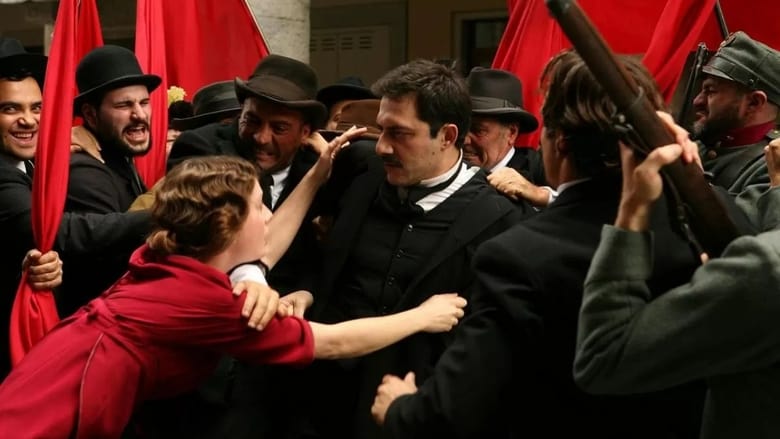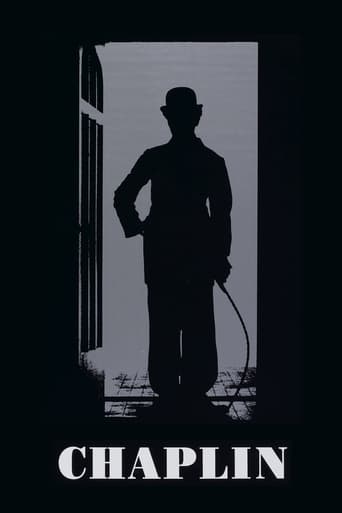Vincere (2009)
The story of the descent into madness of Mussolini's secret first wife, Ida Dasler, who was seduced by his passion and vigor but blind to the fascist dictator's many flaws.
Watch Trailer
Free Trial Channels
Cast


Similar titles
Reviews
Highly Overrated But Still Good
Although it has its amusing moments, in eneral the plot does not convince.
In truth, there is barely enough story here to make a film.
This is a must-see and one of the best documentaries - and films - of this year.
Vincere,an Italian word for English,is a film that is based on the tragic lives of Benito Mussolini's first wife,Ida Dalser and their son,Benito Albino.It features the Giovanna Mezzogiorno as Ida and Filippo Timi in a dual role as Mussolini himself and his son,Benito Albino as an adult together with Fausto Russo Alesi,Michela Cescon and Pier Giorgio Bellocchio.Marco Bellocchio directs.It tells the story of Ida, who fell in love with the future Italian Fascist leader, Benito Mussolini.She supported him while he was unemployed as she shares his dream in life that involves triumphantly leading the Italian masses away from monarchy.She believes wholeheartedly in his ideals and his future as the leader of Italy that she sells everything she has to fuel the development of his newspaper, Il Popolo d'Italia.They got married around 1914. She bore Mussolini a son named Benito Albino, before the outbreak of World War I.While the two fell in love,he quickly switches spiritual and political allegiances from an atheistic socialist to a deeply Catholic fascist because an, allegiance with the Vatican will allow him to wrest and retain control over Italy's government.Following his political ascendancy in 1925,the marriage certificate disappears and Ida learns that he has married Rachele Guidi with whom he had a daughter.She unwisely begins to protest the situation persistently that she was forced into house arrest and then shoved permanently Ida and their son into an insane asylum which determined her fate and the future of her young son. The film ended stating that Ida died in an asylum of brain hemorrhages;her son died as well in 1942 at an asylum after repeated coma-inducing injections; and Mussolini was killed by his enemies.This is a definitely one of the best Italian films I have ever seen.Mezzogiorno provides a great performance as Ida as well as Timi,who definitely will mesmerize the viewer as the ambitious young Mussolini and his insane son as an adult particularly when imitates his father's speech among his friends.Although the story started very well and it loses steam when both Ida and Benito Albino becomes mentally ill,the performances on the lead stars will keep us involved in the film.It also has a great cinematic lesson that worship of false leaders can lead to both personal breakdown and national collapse. Added to that,the film has a lot of passionate and emotional moments despite the fact that it can be incoherent at times especially if one is not well- versed with Italian history and the life of the late Fascist dictator.But overall,it is a can't miss film.Definitely,highly recommended.
The beginning of the XXIst Century gave Italy the well-needed reminder of the realities of Mussolini's reign of power. After a storm of revisionism came the story of Ida Dalser, Mussolini's secret lover and possible wife, who suffered state persecution during his march to power. Given Italy has seemingly forgotten the legacy of Mussolini in chemical-warfare annihilated Ethiopia, a more personal account of the man's cruelty seems to have been a necessity.Ida Dalser (Giovanna Mezzogiorno), obsessively in love with the indomitable and vigorous Mussolini (Filippo Timi), throws her life at his door during the heydays of the First World War, offering not only herself, but also all her belongings to fund Mussolini's party newspaper. Albeit no concrete proof of this exists (only indirect evidence regarding Mussolini's son using the phrase "his wife Ida Dalser") they most likely married in 1914, only for Mussolini to betray her trust and love by wedding Rachele Guidi (Michela Cescon). In the meantime Ida bears Mussolini's only son Benito Albino, a child disowned by his father to suffer the ignominy of being a bastard. As time unfolds and the position of Mussolini strengthens Ida and her child become a unwanted presence, which threatens to derail the career of the future power-crazed dictator. Ida's compulsive and unremitting love for Mussolini persists through time, despite her being a woman scorned, thus causing her to become a national risk, who must be locked away. Ostensibly both Ida and her son die locked up in mental asylums, a tightly kept state secret, which must be disposed of."Vincere" fails to follow typical biographical structure, instead flowing through history with style and imagery, interspersed with archive material and frequenting us with visits to the cinema (in true European cinephile fashion). Events are essentially told linearly, but visually stylish flashbacks fill in spaces and ask questions on uncertain facts. The first half of the movie is a captivating victorious piece of cinema, accentuated by two tour de force performances by Mezzogiorno and Timi. The latter provides a forceful and believable performance of the Italian fascist, whose presence alone suddenly supplies apt justification to how he came to power. Timi also plays youthful Benito Albino, where he punctuates the movie with a heart-wrenching, powerful pastiche of Benito Mussolini after being locked up in an asylum. This however is trumped by a spectacular display by Mezzogiorno, compulsive lover repudiated by her husband and ultimately led to her downfall by the state. Shifting from youthful enthralment to verging on mental decrepitude Ida is portrayed masterfully and memorably.Nonetheless the movie falls apart about halfway, as focus diverts from the love affair itself and shifts towards the deadly fallout. Whereas the initial part of the movie captivates, while enraging with a mesmerising biographical portrayal, the second half starts to dwell on Ida's time at the asylum, which is cinematographically fruitless, as well as delivers countless unnecessary melodramatic scenes, which unnecessarily test viewer's patience. Amongst these a scene worthy of ridicule, as Ida gains a few moments of respite from her inevitable fate, wherein the whole town gathers to applaud her in a corny Hollywood fashioned culmination.Some of the storytelling is also off, as focus is placed strongly on imagery, film structure and less on viewer-proofing the understandability. For a lengthy period of the movie Ida is under the protection of one Riccardo Paicher, but questions on as to who this mysterious defender is are only answered towards the end, whereas a simple scene stating that this is Ida's brother-in-law would not have decapitated Bellochio's artistic endeavours.
Veteran Italian director Marco Bellocchio films this (for the most part) entertaining if tragic story of Benito Mussollini's alleged first wife, one Ida Dalser, punctuating the story with a bombastic operatic score and another over the top flourishes. Dalser had a torrid affair with Mussolini just before World War I, when he was a socialist firebrand. According to the movie, the then penniless future dictator was able to fund his revolutionary newspaper from the money Dalser gave to him. When World War I erupted, Mussolini felt the Italian people national solidarity was much stronger than their class solidarity and decided to move to the right and support the war. During that time, he left Dalser for another woman who became his wife (the movie implies that Mussolini not only betrayed Dalser but also his revolutionary ideas). Dalser claimed that Mussolini had married her (she had a son by him she called Benito) but no marriage certificate has ever been found (assuming she was not lying, the certificate was presumably destroyed when the Duce was in power). Since Dalser wouldn't shut up, she was closely watched and harassed by his former lover's secret police. Eventually she is put under the care of the Catholic Church (the atheist Mussolini having decided after coming to power that the Vatican could be a good ally of his regime). Her fate as well as that of her son ends up in tragedy. While the movie shows that Dalser was clearly mistreated by the Duce, she's not a very sympathetic character, unstable, vindictive and unable to let the past go. As a result, while the first part of this film is very entertaining and gripping; the second part is far less compelling: the magnetic Mussolini leaves the screen and we are mostly left with the increasingly crazy ramblings of a scorned woman (however, later in the movie there is a great real footage included of the Duce rambling about Italy's becoming a sea empire). An interesting if not perfect movie.
I just love allegories. I love the way so much imagination is poured into the re-telling of a story via new material. We all know our history, so we know about Benito Mussolini, Il Duce, and his reign of Fascism over Italy. But we don't know about the adulterous relationship he had with a certain Ida Dalser, who gave birth to his child and who Mussolini, in his unforgivable cold-bloodedness, calmly strived to strip apart. That's what Marco Bellocchio's new film, "Vincere", is all about: it's a historical drama about the woman Mussolini tried so hard to ruin after economically and sexually using her...and it's also a sublime allegory of how he used all of Italy.Critics worldwide have seen the genius behind portraying Mussolini's reign of terror as a headstrong but powerless woman. Ida Dalser (Giovanna Mezzogiorno) instantly falls under the spell of a young, handsome Mussolini (Filippo Timi). Italy is only beginning to experience the first waves of Socialism, and among those first to rebel against the government is this young man who has a certain power with words; in a scene where he runs away from the police for being involved in a riot, he shields himself behind the curious Ida who stepped out for a look, and passionately kisses her. I mean, Benito is a good kisser, or so he seems to be, because Ida melts in utter passion in his arms while he kisses her and he...well, he's a really good actor too, for he can focus his strength on this steamy kiss at the same time that his full concentration and awareness are scrutinizing the area to see if the police are gone. Sure enough, once they're gone he pushes Ida away and runs without so much as a half-hearted smile...but the kiss was enough for Ida to fall mercilessly in love with him.In a matter of days, she's stalking him, getting into his fights and showing him glimpses of her crotch which get our all-too human Benito hot for her. The first twenty-something minutes of the film our two main characters spend passionately and intensely going at it. Well, Ida does the passionate part and Mussolini, as I've said before, is a really good actor; while Ida spends her every second in a sexual Nirvana, he is all steam but his stare is distant, serious, no doubt thinking about anything else but the woman coming in his arms. Ida's obsession with the dude takes her as far as selling almost all of her things and giving him all the money so he can establish his own Socialist newspaper. Notice the incredibly sarcastic scene where Ida finally asks Benito to tell her 'I love you.' Mussolini, who at this point of the film hasn't gotten over his hate for Germans, plainly answers 'Ich liebe dich.' But this is an allegory, so here's where the plot thickens. Mussolini just happens to be married, Ida finds out, but he can't move himself to even let her go properly because he's becoming really powerful so he doesn't need her anymore. Ida gives birth to his child, but he couldn't care less. Ida's obsession is so deep, though, that she really starts pestering Benito every living moment she has...and by the time Benito is a 9-year old boy, Ida spills the cup and our villainous dictator sends her to an insane asylum and gives the custody of her son to one of his right-hand men. From here on, it's chaos...both in Italy and on our tragic heroine's life. Just as a side note, the film claims to be based on true events; obviously, the rise of Fascism in Italy IS a true event, but I can't vouch for the verisimilitude of Mussolini's secret lover. I'm ready to believe it, though, because he was such a horrid man that he must've done to thousands of women the very same thing he did to Ida. And not only women: I mean, didn't he screw up millions of people's lives by using them? The film brings the suffering of an entire war-torn country into a very intelligent perspective by allegorizing it into the character of Ida Dalser, and that's more than can be said by any recent historical drama.Sounds good, doesn't it? The acting is pitch-perfect, especially Mezzogiorno who redeems herself for her atrocious main performance in Mike Newell's "Love in the Time of Cholera" and manages to give us a heart-breaking, poignant, sublime and VERY powerful performance (I wonder why she didn't get an Oscar nod? Academy voters must've definitely been high). We see a woman who has no chance of survival, who'll never see her son again, whose life has been ruined by Italy's most powerful man, but her strength and courage stand true to the very last. The screenplay is VERY good, actually; Carlo Crivelli's score is one of the best scores I've heard in a long time (which sounds like a perfect cross between Philip Glass and Dario Marianelli) and Marco Dentici's cinematography couldn't possibly be better. Also, the film never lags, and it touches on so many levels of human suffering and cruelty, that you can't help but me moved to deeper thought. What more can you ask of a film? See it. Italy has outdone itself this year with such an excellent film. No one in their right minds could possibly be disappointed. Rating: 4 stars out of 4!!


















